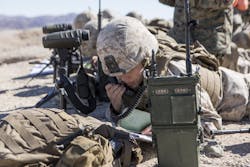Industry asked to use existing sensors to measure neural signals, communications to enhance military teams
ARLINGTON, Va. – U.S. military researchers are asking industry to find ways of tracking physiological and neural signals, as well as communication patterns, to improve how well warfighters work as teams during training and military operations.
Officials of the U.S. Defense Advanced Research Projects Agency (DARPA) in Arlington, Va. issued a broad agency announcement (HR001123S0055) last week for the Objective Prediction of Team Effectiveness via Models of Performance Outcomes (OP TEMPO) program.
DARPA researchers want industry to use existing sensors to find bio-behavioral signals that indicate team performance and characterize these signals in military laptop computer-based team training virtual environments.
The project seeks to validate signals as signatures of team performance to enable a completely new way to understand, model, and assess team dynamics during training.
Related: The coming revolution in sensor and signal processing
Current military team training assessment is limited because it relies on rudimentary checklists and subjective performance evaluations that cannot scale to future team training requirements.
The OP TEMPO project will explore whether bio-behavioral signals like neural and physiological signals, and communication patterns, can be valid indications of team cohesion, collaboration, and performance.
The project revolves around four research tasks: identification; and later characterization of bio-behavioral signatures in military teams; validating these signatures using predictive models of team training performance; and exploring signatures in two additional military use cases. The primary user case will focus on four-person U.S. Marine Corps fire support team (FiST) training.
The 42-month OP TEMPO program has three phases. The first 9-month phase will develop a customized training environment and scenarios for Marine Corps FiST training. The second 21-month phase will design customized training scenarios and identify bio-behavioral signatures that correlate to military team performance. The third yearlong phase will refine simulation-based training environments and assess team training performance.
Companies interested should upload abstracts no later than 1 Dec. 2023, and full proposals by 31 Jan. 2024 to the DARPA BAA website at https://baa.darpa.mil.
Email questions or concerns to Joeanna Arthur, the DARPA OP TEMPO program manager, at [email protected]. More information is online at https://sam.gov/opp/8c9680d6bf9f463bacde2482378caa80/view.
